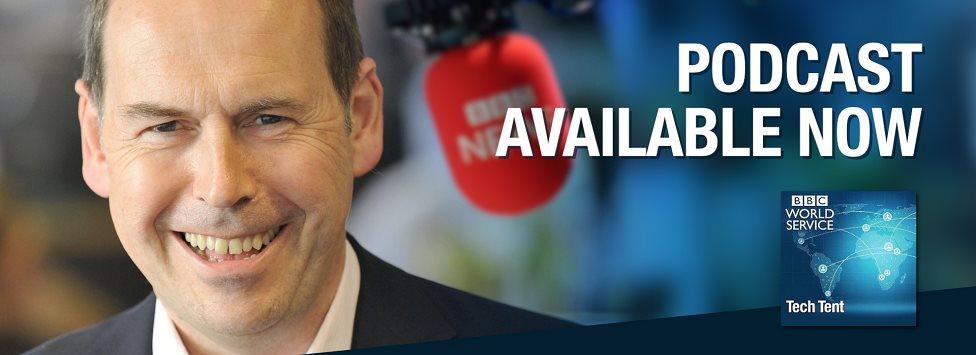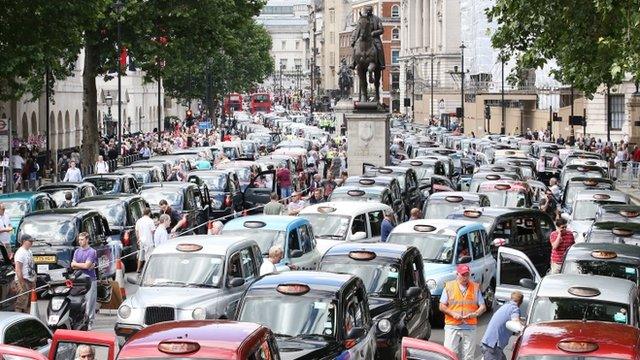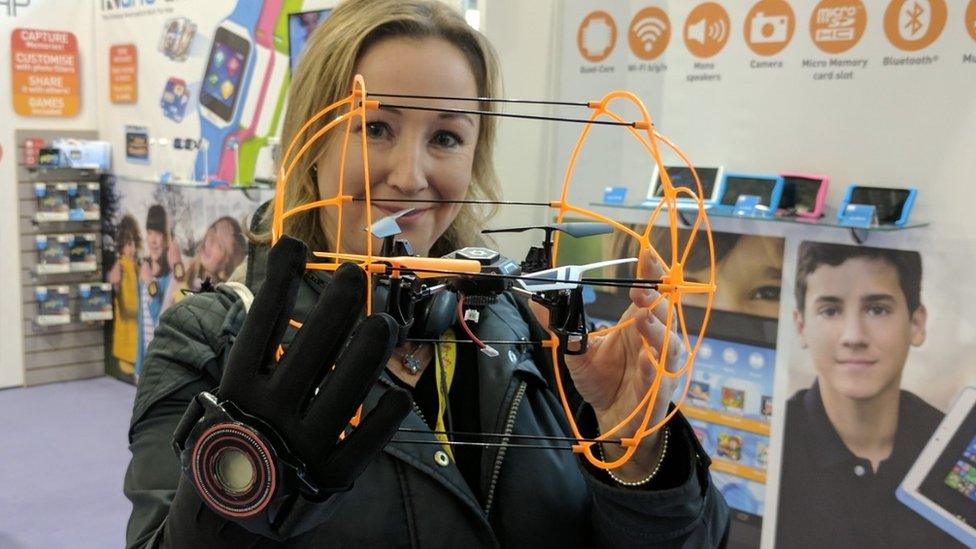Tech Tent: Winners and losers in the 'gig' economy
- Published

Stream the latest Tech Tent episode on the BBC website
Download, external the latest episode as a podcast
Listen to previous episodes on the BBC website
Listen live every Friday at 15.00 GMT on the BBC World Service

On this week's Tech Tent we address one of the key questions of the era - what is new technology doing to jobs? We also look at the hunt for better batteries and find out about the latest technology in the toy industry.
No, Uber isn't wiping out taxi drivers
"Does the expansion of the 'sharing economy' spell the end of traditional jobs?" That's the unusually catchy introduction for an academic paper, external on the effect of Uber on jobs and wages.

Protests from established taxi drivers have greeted Uber's arrival in many cities
Researchers from the Oxford Martin School looked at data from cities in the United States to work out what happened when the taxi app began operating. It found that, contrary to expectations, Uber's arrival had seen an expansion in employment, with an almost 50% increase in the number of self-employed taxi drivers.
The effect on incomes is more mixed. The paper says that the wages of people employed in traditional taxi companies fell by up to 10% after Uber started operating in a city. But the hourly rate earned by self-employed drivers - like those driving for Uber - rose by up to 10%.
One of the authors Dr Carl Frey tells us that you always expect a short-term impact on jobs from new technology, but that has been less radical than expected: "Employment has increased quite rapidly and considering that self-employment increased by 50%, you could think that wage reductions of around 10% are not that dramatic."
But the effects of technology on driving jobs may get more dramatic if Uber's research into self-driving cars bears fruit. Dr Frey was also one of the authors a few years ago of a study of the effects of automation on employment. It found that more than 40% of jobs could be threatened by the rise of the robots over the next 10 to 20 years - though later work by the OECD said that was an exaggerated view.
Dr Frey is still of the view that we need to worry far more about the impact of automation on lots of lower skilled jobs than about the so-called gig economy. He tells us that the sharing economy accounts for just 0.5% of employment in the United States, but when it comes to automation there are big incentives at a time of slow growth for companies to cut costs by employing robots rather than humans.

Sodium could be a good replacement for lithium in batteries, suggest chemists
The Quest for Better Batteries
We also hear on the show from one of Britain's leading experts on battery research, Cambridge University's Prof Clare Grey. She was one of the academic experts who helped Samsung investigate what went wrong with its Galaxy Note 7 to cause some to catch fire - and concluded unsurprisingly that it was a fault with the lithium-ion batteries.
Prof Grey tells us lithium-ion batteries are not inherently unsafe but if mistakes are made in manufacturing the materials inside them will react. And with consumers pressing for ever greater performance, "that means we are designing batteries that are more likely to suffer from these types of problems".
At Cambridge and at other universities, scientists are looking at a number of promising new battery technologies, though they often seem to struggle to make it out of the lab. Prof Grey is betting on sodium-ion batteries - where cheap salt replaces expensive lithium - as being the quickest to come to market and provide a somewhat safer and better solution to our ever growing demand for more power.
The Tech of Toys
"That's just a toy," is often the cynical reaction to the latest gadget, especially when they look as though they might be fun. But the toy industry is increasingly where you can see some of the most exciting new technology put to use for discerning young consumers. We sent Zoe Kleinman along to the London Toy Fair to find out about the latest trends in toy tech. It seems gesture-controlled devices, from drones to drum kits, are going to be invading our homes in the very near future.

Zoe Kleinman checks out Gesturebotics' glove-controlled Aura drone